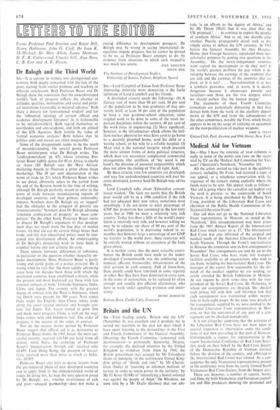Dr Balogh and the Third World
-EE2 LiCa
L_ -J
EE[IMA
From: Professor Paul Streeten and Roger Hill, Henry Hobhouse, John G. Cluff, Dr Joan K. McMichael, Sir Max Aiken, James Mottram, II. F. R. Catherwood, Charles Gill, Alan Ross, C. B. Cox and A. E. Dyson.
SIR,—It is curious to witness two distinguished eco- nomists, both deeply concerned with the fate of the poor, starting from similar premises and reaching so different conclusions. Both Professor Bauer and Dr Balogh share the conviction that the underdeveloped world's 'lack of progress reflects the absence of attitudes, qualities, motivations and social and politi- cal institutions favourable to material advance.' Both share a distaste for 'conventional wisdom' and for the 'influential ideology of current official and academic development literature' (is it fashionable to be unfashionable?). Both regard themselves as unorthodox and anti-academic, and both are critical of the UN Agencies. Both belittle the value of 'formal economic analysis.' Both believe that 'in politics ends and means are often inseparable.'
Some of the disagreement seems to be the result of misunderstanding. On several points Professor Bauer misinterprets what Dr Balogh writes. The 'landlord-merchant' (p. 67), whose existence Pro- fessor Bauer rightly denies for West Africa, is clearly an Asian (Dr Balogh uses the West African marketing boards to illustrate a point about Asian marketing). The 30 per cent deterioration in the terms of trade (p. 21), which Professor Bauer wishes to see dated, obviously refers to the period from the end of the Korean boom to the time of writing, although Dr Balogh probably meant to refer to the terms of trade between manufacturing exports of developed countries and their primary commodity imports. Nowhere does Dr Balogh say or 'suggest' that the obstacles to the conquest of poverty are 'insurmountable.' Nowhere does Dr Balogh advocate 'extensive confiscation of property' or 'mass com- pulsion.' On the other hand, Professor Bauer omits to discuss Dr Balogh's arguments (i) that develop- ment does not result from the free play of market forces; (ii) that aid can do certain things better than trade; and (iii) that educational policy must be inte- grated into development efforts. An understanding of Dr Balogh's pioneering work in these fields is essential before one can criticise his case.
There remain, however, differences of substance, in particular on the question whether inequality im- pedes development. Here, Professor Bauer is partly wrong and partly guilty of a petitio principii. He is wrong when he says that 'the most rapidly advancing areas have for decades been those with which the developed countries have established contacts, while the poorest and most backward are those with few external contacts or nonc.' Consider Indonesia, India, China and Japan. The country with the greatest degree of contact with the West is Indonesia, where the Dutch were present for 300 years. Next comes India under the English; then China, where trade along the coast created enclaves and brought con- tact; last Japan. Yet, Japan started to grow first and made most progress; China is well on the way; India comes next and Indonesia last. The order of progress is the reverse of the order of contact.
Nor do the success stories quoted by Professor Bauer suggest that official aid is as destructive as Professor Bauer thinks. In 1963, Israel, the most suc- cessful country, received £16.540 per head from all donors, while India, the archetype of Professor Bauer's 'pauperisation through aid,' received only £0.439. Even Hong Kong, the paragon of laissez- faire, received more than twice as much as India, viz., £0.955.
Professor Bauer also tries to derive lessons from the pre-industrial phase of now developed countries and to apply them to the underdeveloped world of today. In doing this, he begs the very question posed by Dr Balogh: viz., whether co-existence of rich and poor—unequal partnership—does not make a crucial difference to development prospects. Dr Balogh may be wrong in saying international in- equalities impede progress, but he cannot be proved to be so, as Professor Bauer attempts to do, by evidence from situations in which such inequality was much less severe.
PAUL STREETEN ROGER HILL
The Institute of Development Studies, University of Sussex, Palmer, Brighton, Sussex














































 Previous page
Previous page